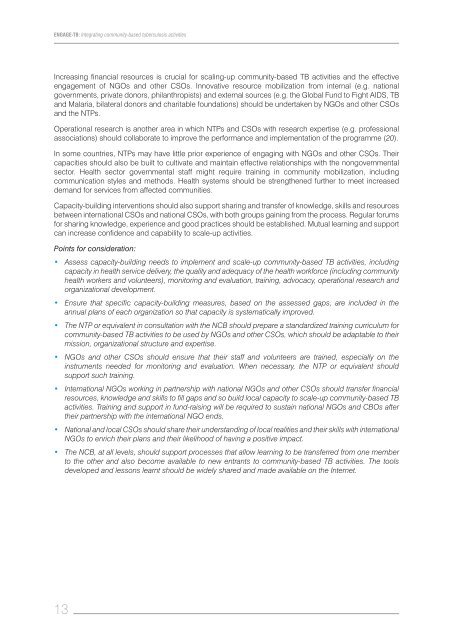ENGAGE-TB: Operational Guidance - World Health Organization
ENGAGE-TB: Operational Guidance - World Health Organization
ENGAGE-TB: Operational Guidance - World Health Organization
You also want an ePaper? Increase the reach of your titles
YUMPU automatically turns print PDFs into web optimized ePapers that Google loves.
<strong>ENGAGE</strong>-<strong>TB</strong>: Integrating community-based tuberculosis activities<br />
Increasing financial resources is crucial for scaling-up community-based <strong>TB</strong> activities and the effective<br />
engagement of NGOs and other CSOs. Innovative resource mobilization from internal (e.g. national<br />
governments, private donors, philanthropists) and external sources (e.g. the Global Fund to Fight AIDS, <strong>TB</strong><br />
and Malaria, bilateral donors and charitable foundations) should be undertaken by NGOs and other CSOs<br />
and the NTPs.<br />
<strong>Operational</strong> research is another area in which NTPs and CSOs with research expertise (e.g. professional<br />
associations) should collaborate to improve the performance and implementation of the programme (20).<br />
In some countries, NTPs may have little prior experience of engaging with NGOs and other CSOs. Their<br />
capacities should also be built to cultivate and maintain effective relationships with the nongovernmental<br />
sector. <strong>Health</strong> sector governmental staff might require training in community mobilization, including<br />
communication styles and methods. <strong>Health</strong> systems should be strengthened further to meet increased<br />
demand for services from affected communities.<br />
Capacity-building interventions should also support sharing and transfer of knowledge, skills and resources<br />
between international CSOs and national CSOs, with both groups gaining from the process. Regular forums<br />
for sharing knowledge, experience and good practices should be established. Mutual learning and support<br />
can increase confidence and capability to scale-up activities.<br />
Points for consideration:<br />
• Assess capacity-building needs to implement and scale-up community-based <strong>TB</strong> activities, including<br />
capacity in health service delivery, the quality and adequacy of the health workforce (including community<br />
health workers and volunteers), monitoring and evaluation, training, advocacy, operational research and<br />
organizational development.<br />
• Ensure that specific capacity-building measures, based on the assessed gaps, are included in the<br />
annual plans of each organization so that capacity is systematically improved.<br />
• The NTP or equivalent in consultation with the NCB should prepare a standardized training curriculum for<br />
community-based <strong>TB</strong> activities to be used by NGOs and other CSOs, which should be adaptable to their<br />
mission, organizational structure and expertise.<br />
• NGOs and other CSOs should ensure that their staff and volunteers are trained, especially on the<br />
instruments needed for monitoring and evaluation. When necessary, the NTP or equivalent should<br />
support such training.<br />
• International NGOs working in partnership with national NGOs and other CSOs should transfer financial<br />
resources, knowledge and skills to fill gaps and so build local capacity to scale-up community-based <strong>TB</strong><br />
activities. Training and support in fund-raising will be required to sustain national NGOs and CBOs after<br />
their partnership with the international NGO ends.<br />
• National and local CSOs should share their understanding of local realities and their skills with international<br />
NGOs to enrich their plans and their likelihood of having a positive impact.<br />
• The NCB, at all levels, should support processes that allow learning to be transferred from one member<br />
to the other and also become available to new entrants to community-based <strong>TB</strong> activities. The tools<br />
developed and lessons learnt should be widely shared and made available on the Internet.<br />
13

















